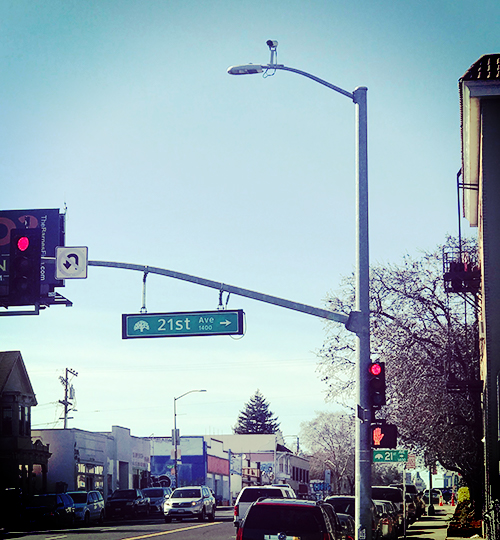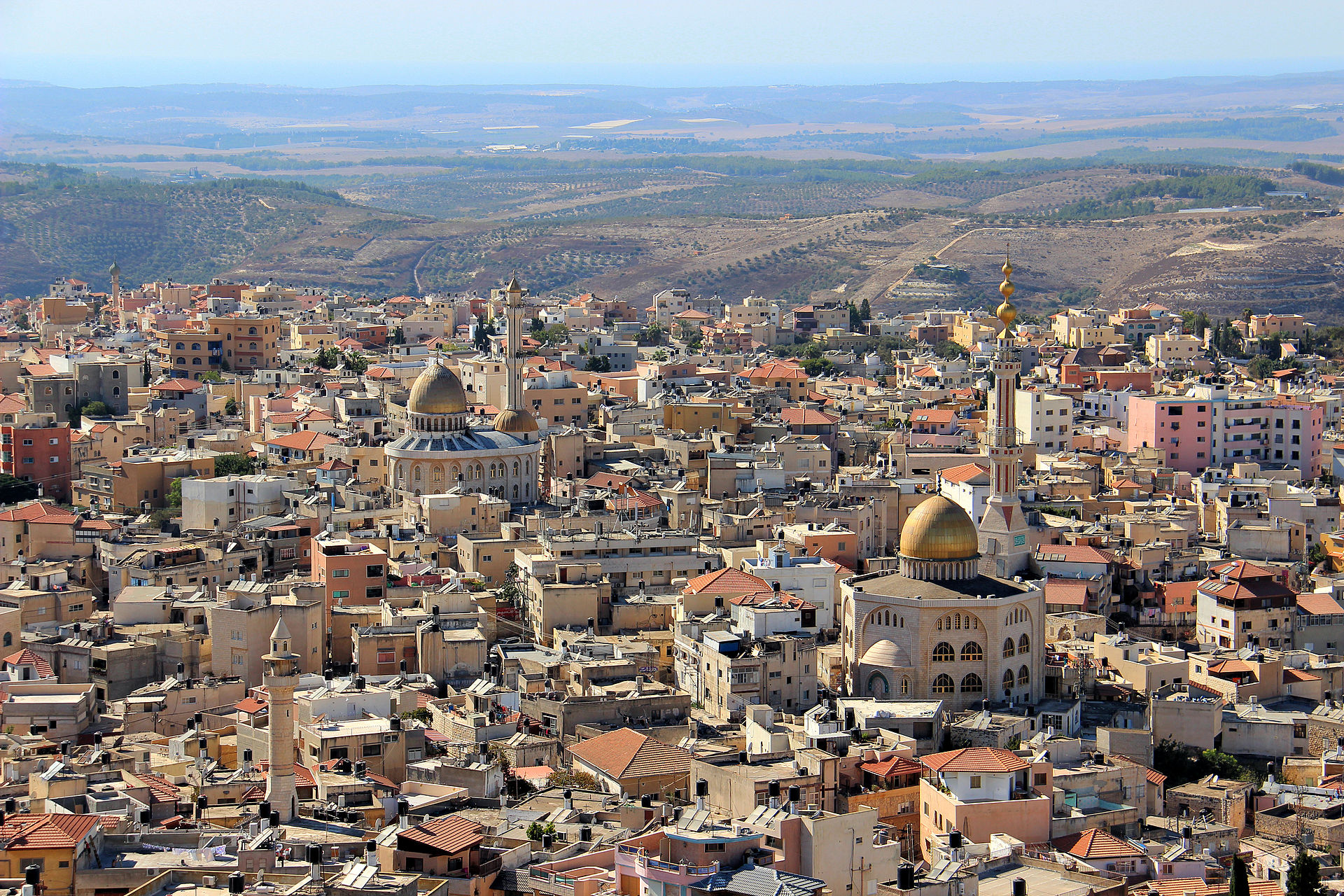By Marziyeh Sheraze Published on April 3, 2013 It was late in August and near the end of summer when my family decided to finally embark on a trip we had been discussing for six years. It was now or never, so the preparation began. Reservations were made for four cabins, at a camp ground in Tobermory, Ontario, a small town located northwest of Toronto at the tip of the Bruce Peninsula. A couple of days before the trip, my brother and I pulled up some internet reviews of the camp ground. Some reviews were positive while others lowered our expectations. But online reviews are only just that, a review: a retrospective view of some stranger. Excited and determined to explore what lies ahead, we packed our bags and went forward with our plans. Where else would we find an end of the season package that could accommodate a family of twenty? Early on a Thursday morning we started to load two of the five cars which were heading to Tobermory, with our GPS fed with the addresses of the meeting points and destination. After a five hour drive with our music playlist on repeat and the rhythmic complaints of everybody’s feet going numb, our GPS told us in an Australian accent, “you have arrived at your destination.”

 The next morning as my cousins and I headed out for a hike at the Bruce Peninsula National Park, we noticed that the camp grounds had a petting zoo. Who could resist petting llamas, ponies and goats? My little cousins sure couldn’t. Over by the enclosed area stood a young girl wearing a plain, long dress, apparently feeding the animals. At first glance, the girl reminded me of reviews referring to the camp ground owners as Mennonites or Amish. One reviewer said that the camp ground was “run by an Amish family – very bizarre.” Another reviewer commented that “They may not be Dutch Mennonite but they sure look the part.” Mennonites – I thought of all I had ever read or seen of them; books like Miriam Toews’ A Complicated Kindness, and TV shows with a similar theme: a protagonist is born into a community that is very restrictive and is often separated from the outside world, and the protagonist struggles to find freedom. This young girl, feeding the animals in the petting zoo, was like the protagonist from all those stories. I had her pegged from the minute I saw her; I thought she was going to be timid, soft-spoken and shy. As we approached her, she introduced herself as Grace, and asked if we wanted to feed some grains to the animals. She quickly brought out buckets of grain, poured some onto her hands and began to show us how to feed them. When one of my cousins asked Grace if there was a long commute to school, she cleverly responded “no, my school is just twenty steps away from here.” as she was home schooled. There was a confident charm about her.
When we returned from the hike, we saw Grace standing by one of the cabins, this time with her mother and grandmother. They too wore plain-looking maxi dresses, but they were also wearing a head cover; they later explained it was called a tichel. Grace and her mother and grandmother greeted us warmly, and we talked about how wonderful it was to meet people from different cultures. They asked where we were from, and just then Grace quickly asked, “Guess where we are from?” Once again I thought of the reviews I had read online. It was only when they told us that I realized that they were not Amish nor were they Mennonites. They were Jewish. Grace told us with pride that her family was from Israel. She was born in Mississauga, a suburb outside of Toronto, but strongly identified with being Israeli. Her grandmother also told us that she was born in Germany and that her family fled during World War II. They had bought the camp grounds approximately ten years ago and built the cabins themselves, as a family. Listening to Grace’s fondness for Israel made me think of how I identified with being Pakistani, despite my family’s Iranian background. Despite our cultural and religious differences, we could relate to each other and all it took for us to bond was a simple conversation.
On our way back from Tobermory, I wondered how many people make assumptions about who I am. The colour of my skin, the clothes I choose to wear or not to wear; do these superficial things define who I am? In an ideal world, these would not be the factors that one would be judged by. Instead, we would be defined by the words that we speak, and the things that we do. I do not know if the online reviewers meant any harm by what they wrote, and I do not know if they ever tried to get to know Grace’s family. But I do know that it is important to realize that reviews are partial and subjective. They reflect the partial viewpoints and limited perspectives of individuals like all of us. The best we could do is to consider multiple points of view and try to move beyond our preconceptions. Sometimes, it just takes a conversation at a camp ground.
The next morning as my cousins and I headed out for a hike at the Bruce Peninsula National Park, we noticed that the camp grounds had a petting zoo. Who could resist petting llamas, ponies and goats? My little cousins sure couldn’t. Over by the enclosed area stood a young girl wearing a plain, long dress, apparently feeding the animals. At first glance, the girl reminded me of reviews referring to the camp ground owners as Mennonites or Amish. One reviewer said that the camp ground was “run by an Amish family – very bizarre.” Another reviewer commented that “They may not be Dutch Mennonite but they sure look the part.” Mennonites – I thought of all I had ever read or seen of them; books like Miriam Toews’ A Complicated Kindness, and TV shows with a similar theme: a protagonist is born into a community that is very restrictive and is often separated from the outside world, and the protagonist struggles to find freedom. This young girl, feeding the animals in the petting zoo, was like the protagonist from all those stories. I had her pegged from the minute I saw her; I thought she was going to be timid, soft-spoken and shy. As we approached her, she introduced herself as Grace, and asked if we wanted to feed some grains to the animals. She quickly brought out buckets of grain, poured some onto her hands and began to show us how to feed them. When one of my cousins asked Grace if there was a long commute to school, she cleverly responded “no, my school is just twenty steps away from here.” as she was home schooled. There was a confident charm about her.
When we returned from the hike, we saw Grace standing by one of the cabins, this time with her mother and grandmother. They too wore plain-looking maxi dresses, but they were also wearing a head cover; they later explained it was called a tichel. Grace and her mother and grandmother greeted us warmly, and we talked about how wonderful it was to meet people from different cultures. They asked where we were from, and just then Grace quickly asked, “Guess where we are from?” Once again I thought of the reviews I had read online. It was only when they told us that I realized that they were not Amish nor were they Mennonites. They were Jewish. Grace told us with pride that her family was from Israel. She was born in Mississauga, a suburb outside of Toronto, but strongly identified with being Israeli. Her grandmother also told us that she was born in Germany and that her family fled during World War II. They had bought the camp grounds approximately ten years ago and built the cabins themselves, as a family. Listening to Grace’s fondness for Israel made me think of how I identified with being Pakistani, despite my family’s Iranian background. Despite our cultural and religious differences, we could relate to each other and all it took for us to bond was a simple conversation.
On our way back from Tobermory, I wondered how many people make assumptions about who I am. The colour of my skin, the clothes I choose to wear or not to wear; do these superficial things define who I am? In an ideal world, these would not be the factors that one would be judged by. Instead, we would be defined by the words that we speak, and the things that we do. I do not know if the online reviewers meant any harm by what they wrote, and I do not know if they ever tried to get to know Grace’s family. But I do know that it is important to realize that reviews are partial and subjective. They reflect the partial viewpoints and limited perspectives of individuals like all of us. The best we could do is to consider multiple points of view and try to move beyond our preconceptions. Sometimes, it just takes a conversation at a camp ground.

 Marziyeh Sheraze is a third year student at UTSC, working toward a double major in Psychology and Geography. Marziyeh hopes to eventually work as a counselor for abused women. In her spare time she enjoys watches movies – one of her favourite films is Eternal Sunshine of the Spotless Mind. She also enjoys reading books, and will read anything written by Paulo Coelho.
Marziyeh Sheraze is a third year student at UTSC, working toward a double major in Psychology and Geography. Marziyeh hopes to eventually work as a counselor for abused women. In her spare time she enjoys watches movies – one of her favourite films is Eternal Sunshine of the Spotless Mind. She also enjoys reading books, and will read anything written by Paulo Coelho.
Further reading suggestions
Byrne, Jason, and Jennifer Wolch. 2009. “Nature, Race, and Parks: Past Research and Future Directions for Geographic Research.” Progress in Human Geography 33 (6): 743-765.
Finney, Carolyn. 2014. Black Faces, White Spaces: Reimagining the Relationship of African Americans to the Great Outdoors. Chapel Hill, NC: University of North Carolina Press.
Livengood, Jennifer S., and Monika Stodolska. 2004. “The Effects of Discrimination and Constraints Negotiation on Leisure Behavior of American Muslims in Post-September 11 America.” Journal of Leisure Research 36 (2): 183-208.
Marks, Lynne. 1996. Revivals and Roller Rinks: Religion, Leisure and Identity in Late Nineteenth Century Small Town Ontario. Toronto: University of Toronto Press.
Thorpe, Jocelyne, and Stephanie Rutherford. 2010. “National Natures in a Globalized World: Climate Change, Power and the Erasure of the Local.” The Dalhousie Review 90 (1): 127-138.
]]>


Brilliant, brilliant, brilliant. Loved the depth, thought and intelligence with which you chose to portray your perspective. Well done. 🙂
I very much enjoyed hearing you read your reflection today at the launch.
You make us all proud little one. I love you. Very well written.
This is lovely!! Enjoyed reading it 🙂 and yes all of it 😉
I thought of the same book as soon as I read “mennonite” too haha
Keep on writing!
Very well written and a nice read!
Interesting story and beautifully written. This story discusses the fear of ‘Other’. When visiting an unknown land people do worry about what others will think and what to expect. It is both exciting and frightening.
This is a beautifully written story, and the questions you bring up regarding the “need” of humans to categorize things and make assumptions are pertinent. I love to consider multiple perspectives for the purpose of moving beyond preconceptions, and my upbringing as part of an open-minded, mixed-religious household contributed to that. My mother is Muslim and my father is Christian; neither made me “choose” a religion as a child and let me explore the world in my own way. I’m very grateful for that, and I believe it’s allowed me to see past religious differences with hopes of relating to others, similar to how you and Grace wonderfully interacted in Tobermory.
In this story, the author takes on the idea of considering different parts of ourselves that make us who we are whether it be based on religion or culture. The author makes a point about how people of different backgrounds can connect with and relate to one another through just talking and getting to know someone. I grew up in a Muslim family and living in Canada, I feel different than everyone else because some people make blind judgments towards Islam. The story points out that there’s a lot of fear towards the “other”. This has led me to become open minded towards people who come across my way.
A fascinating and enjoyable read! Your story is a perfect example of Jon Anderson’s idea on places and traces. The online reviews on the camp ground are the traces left by people from the past creating an identity for the place. It shows that as long as this place has visitors, the ideology and identity of the camp ground will constantly change over time. I agree that the world is seen through preconceptions because from my experience, I check online reviews of restaurants to have a sense before I eat. However, we need to be at the place ourselves to capture the true experience.
An interesting experience! Instead of what other people have reviewed on one place, sense of place came from your own personal feelings and experiences. Just like you mentioned, “a retrospective view of some strangers”, and those views could be distorted based on their own opinions and experiences, whether consciously or not. As a sight of a geographer, whenever you identifying the world or trying to develop a sense of place, never making assumptions and judging one place according to others opinion. Every place is unique and special, so just go out and “arrive at your new destinations”.
This story is beautifully written with the insights you gave, about online reviews on a particular place, to portray your perspective. I agree to what you said that online reviews are partial, and that we have to move beyond our preconceptions. We define places according to how we feel about it, since we all have different interpretations on certain places and things. It is better to have insights of your own on a place you want to visit, than just making assumptions of a specific place by reading an online review.
Interesting and very insightful story! Great example of Jon Anderson’s idea on places and traces. Reviews are examples of people’s experiences at a certain place (traces) which creates an identity for the place. The reviews on the cabin gave her ideas that were completely different then her actual experiences. I agree that people judge based on superficial ideals before they actually get to know the person or place. To base your whole experience on a review isn’t realistic because every person’s experience will be completely different.
The constant allusions to reviews by other people in this article goes to show how in today’s internet age, social media platforms have indeed changed the way we look at things. From wanting to experience it ourselves, we now rely on what others say and base our judgements there. That being said, the reviews alluded to here agree heavily to the idea that we should not be too concerned, to some extent, with what others would say. They are a good place to go to in help with discernment, yet it should not be the final factor in our judgement.
Thank you for sharing your wonderful story. Your narrative certainly did not end how I thought it would. I too am guilty of not acknowledging my own bias perspective. Sometimes it’s so difficult to separate our own personal bias when assessing a situation. Just as in the case you described with the little girl. I think there would be a lot less miscommunication had we all just asked the right questions. Perhaps this brings to light our natural inclination to be weary with the unfamiliar. Your narrative inspired me to be a little more critical of my perception, especially when relating to other cultures!